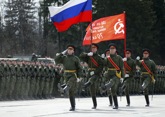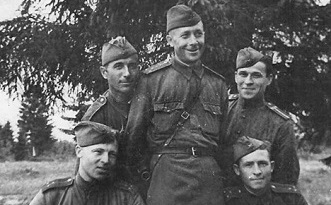Veterans recall the impact and lessons of World War
The Russian Centre of Science and Culture (RCSC) in New Delhi organized a seminar with the Indian Veterans’ Forum on April 27, 2015, with speakers recalling the sacrifice and sufferings of the erstwhile Soviet Union during World War II. Speakers, drawn largely from the armed forces, spoke of the impact of that war, known in Russia as the Great Patriotic War (1941-1945), and the lessons the world has learnt from it.
The audience comprised veterans of the Indian Armed forces, members of the diplomatic community and the Ministry of External Affairs. The Seminar, on “World War II—Its Impact and Lessons for the Contemporary World,” was among several events organized to commemorate the 70th Anniversary of the Victory over Fascism.
Among those who spoke were Rao Inderjit Singh, India’s State Minister of Defence, Meenakshi Lekhi, MP for New Delhi, Lt. Gen. A.S. Lamba (Retd.), Former Vice Chief of Army Staff, Air Vice Marshal Kapil Kak (Retd.), Centre for Air Power Studies, Sergey Karmalito, Senior Counsellor in the Russian Embassy and Ajai Malhotra, former Indian Ambassador to Russia.
The St. George Ribbon, one of the most recognized and respected symbols of military valour in Russia, was prominently on display.
Rao Inderjit Singh, profusely praising the Soviet war effort, also recalled the Indian contribution in World II.
Describing May 9, 2015 as a historically significant date, Singh spoke of the Victory Day Parade in Moscow next month, at which the Indian President will be present. India’s armed forces too would be represented with a marching contingent of 75 members of the Grenadiers Regiment to participate in the Victory Day parade to celebrate the dawn of peace and stability post the Great War.
He spoke of three significant war-related issues: the geo-political environment and circumstances that led to the outbreak of the war in 1940s, the impact the war had on the future course of world history and geo-politics and economies, and major lessons that the war has to offer to future generations of political and military leaders.
In her address Lekhi said Russia and India could jointly contribute to development, peace and progress by making joint efforts to prevent future wars from threatening the safety and security of humanity.
Describing the nature of the World War II, Lt. Gen Lamba (Retd.) said there were many Allies, but the Soviet Union bore the greatest brunt of the war. Speaking of the military aspects of the war, he recounted Russia’s role in reversing the wave of Nazism and brutality towards a stable and peaceful World Order in 1945.World War II had an unmistakable impact on Russian identity, the effect of which are still witnessed today in the nation’s contemporary foreign policy, he said. “Victory Day and the entire World War II experience have become one of the defining moments of Russian civilization,” Lt. Gen. Lamba said.
Karmalito narrated the horrors of World War II, saying victory over fascism was achieved at huge human and material cost. More than 62 million people perished while entire cities and villages were wiped out. The 70th anniversary should lead to introspection and remind the world to take timely steps to prevent Nazi – like powers from coming to power anywhere, or being propped up.
Malhotra raised a note of caution on the dangerous political and economic course of future wars, particularly in terms of vital resources like water and energy. Malhotra spoke of the nature and significance of India’s special strategic partnership with Russia.
AVM Kak (Retd.) highlighted the role of the air component in any future conflicts and said, given India’s growing importance in international affairs, India deserved to be a permanent member of the UN Security Council.
Fedor Rozovskiy, Director, RCSC, thanked the participants and valued the inputs that emanated from the deliberation for scholars, researchers and students of political science and world history.
First published by Rossotrudnichestvo.
All rights reserved by Rossiyskaya Gazeta.
Subscribe
to our newsletter!
Get the week's best stories straight to your inbox

